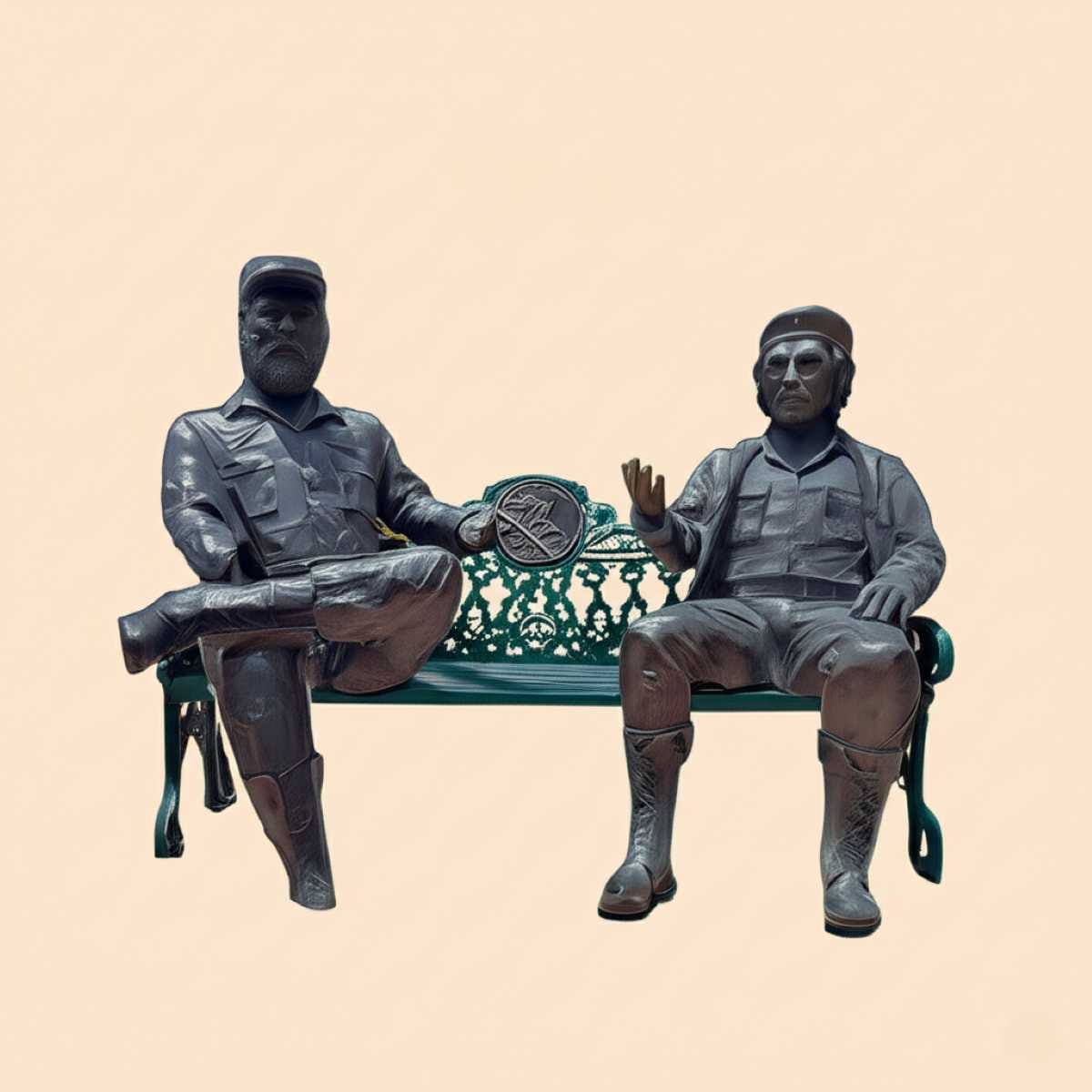Controversy Erupts as Mexico City Mayor Advocates for Statue Return
Mexico City's Mayor Clara Brugada suggests returning statues of Fidel Castro and Che Guevara to Plaza San Carlos after their controversial removal by the Cuauhtémoc borough. The removal sparked debate, with locals and visitors.

Welcome to The Mexicanist, your go-to source for the most intriguing and impactful news from Mexico. Today, we dive into the latest developments in crime, politics, and social issues, bringing you stories that matter. Let's get started.
Sheinbaum Rejects Additional Border Wall in New Mexico
President Claudia Sheinbaum has firmly rejected the construction of an additional border wall in New Mexico, emphasizing that collaboration between countries has already led to a more secure northern border. "We do not agree with the wall. Without it, we have achieved a very secure border through collaboration and coordination. It is not necessary; it is a decision of President Trump," Sheinbaum stated during her morning press conference at the National Palace.
Sheinbaum highlighted that Mexico is not contributing financially to the wall's construction, stating, "No, no, no. They are doing it themselves." She emphasized that her foreign policy is based on cooperation for development and respect for the rights of Mexicans in the United States. When asked about a potential meeting with Trump, she mentioned there are no plans but noted that a Mexican delegation is in Washington to avoid the 30 percent tariffs on Mexican products announced by the Republican starting August 1.
Later, during her tour in Tuxtla Gutiérrez, Chiapas, the president affirmed that in negotiations with the United States, her government has firm principles: "The sovereignty and well-being of the Mexican people are not negotiable."
Sheinbaum also responded to statements by U.S. prosecutor Pam Bondi, who accused undocumented migrants of collaborating with drug cartels. "Our countrymen living there are extraordinary people. Migration should not be criminalized," Sheinbaum emphasized. She noted that the perception of migrants has improved in American society, citing a Gallup poll where 79 percent of U.S. citizens consider immigration beneficial.
Meanwhile, Foreign Minister Juan Ramón de la Fuente addressed the case of Jaime Alanís García, a Mexican agricultural worker who died on July 12 after falling from a roof during a raid in California. He indicated that the Mexican government is providing legal advice to the family to file a lawsuit in U.S. courts.
De la Fuente clarified that while Mexico cannot directly file the lawsuit, it is supporting the process through authorized legal firms to litigate in the United States. "In this case, there is already a lawyer in contact with the family in Oaxaca, California," he detailed. The lawsuit will be pursued through civil channels. Regarding the repatriation of the body, he mentioned that they are awaiting the coroner's final report, but the process is nearing completion.
Additionally, De la Fuente announced that 100 percent of consular procedures have been digitized through the Mi Consulado portal, which will help eliminate intermediaries and prevent corruption in appointments. A single virtual window with standardized attention has also been created.
Brugada Suggests Return of Che and Castro Statues to Tabacalera
Clara Brugada, the head of government of Mexico City, suggested that the statues of Fidel Castro and Ernesto "Che" Guevara could return to their original location in the Plaza San Carlos in the Tabacalera neighborhood. This follows the recent removal of the statues by the Cuauhtémoc borough, which did not follow the normative procedures established by the Monuments Committee.
Brugada emphasized that while the borough has the right to request the removal of the statues, it cannot act unilaterally. "The borough is within its rights to request the committee to remove it, not to remove it on its own," she stated.
The removal of the statues has sparked controversy, with various groups condemning the action. Neighbors and visitors have expressed their support for the statues' return, arguing that there was no consultation with the local community. "There was no consultation with the people who live in the neighborhood. It is not good for living; it is very clear that it is an ideological issue for Alessandra Rojo de la Vega to generate ideas," said Salvador, a local resident.
The statues have been a point of contention, with some viewing them as symbols of historical memory and others seeing them as contentious political figures. The debate continues as the city grapples with its approach to public monuments and historical representation.
World Cup 2026: Business Over Heat and Extreme Contamination
The 2026 World Cup in the United States is set to face significant challenges due to extreme heat and contamination. The tournament, which will feature 48 teams and 104 matches, coincides with the peak hurricane season, wildfire season, and high thermal stress periods. The increased number of matches will also double the use of infrastructure and energy resources, making this edition the most polluting in history with total emissions of 9.02 million tCO2e, nearly double the average for the World Cup.
The International Federation of Professional Footballers (FIFPro) has warned about the saturation of the calendar and the unilateral, authoritarian approach based on FIFA's economic profitability. Sergio Marchi, president of the union, stated, "The boss who thinks he is God," referring to FIFA President Gianni Infantino. The union's document highlights that six of the 16 host cities for the World Cup are at "extremely high risk" for heat stress in players, according to the Wet Bulb Globe Temperature (WBGT) index.
The heat assessment indicates that states like Denver, Houston, Kansas City, Los Angeles, New York, and New Jersey, as well as Monterrey, must manage heat stress as temperatures can reach up to 44 degrees Celsius during some matches.
Despite these concerns, FIFA has maintained its traditional June-July schedule for the 2026 Cup. "In Qatar, they changed the dates to November-December to avoid the scorching summer heat, but in the United States, there has been no major debate about the heat," noted Argentine journalist Manuel Fernández Moreno. "The country became almost a pioneer in labor rights in the Gulf region, which is highly exploitative of migrants."
The experience of attendees at the Club World Cup, with shirts soaked in sweat and abandoned seats in the hottest sections, mirrors the concerns expressed by players and coaches in pre-match press conferences. "This affects football and entertainment," said Álvaro Nannu, present at various stadiums during the tournament as a journalist. "Many matches were played at temperatures above 32 degrees with a heat index of 36 or 39 due to humidity. It is dangerous, and we don't know how FIFA will solve it."
The protocols for safety in the United States require suspending outdoor sports activities for at least 30 minutes when lightning is detected within a 13-kilometer radius. If another storm approaches within this period, the countdown resets to zero, making it impossible to predict when matches will resume. The delay time for the six matches that activated the protocol in the Club World Cup was 8 hours and 28 minutes, including the Benfica-Clubes match at the Bank of America Stadium in Charlotte, which resumed 2 hours after its suspension, five minutes before the end.
Dr. Jesús Felipe González and Dr. Carlos Suárez Abado, specialists in sports medicine, agree on the risks of playing under extreme conditions, which can lead to muscle fatigue, dizziness, loss of consciousness, and heat strokes, such as the one suffered by Chelsea captain Enos Fernández in New Jersey during the semifinal against Fluminense.
With the global increase in temperatures, FIFA extended hydration breaks during the Club World Cup matches in response to concerns raised by players and FIFPro. However, these breaks also served as advertising opportunities. Sponsored by an energy drink brand, the breaks were announced on the big screens with the brand's logo, raising questions about the commercialization of player safety.
The hydration protocol was activated at temperatures above 32 degrees, which some consider excessive. "What are we waiting for? For something more serious to happen?" questioned Marchi, president of FIFPro since November 2024.
Infantino has been criticized for his authoritarian approach, with Marchi stating, "Infantino is an autocrat, a guy who decides things on his own without consulting anyone. Football is a party invented by the players, not a circus created by him. He cannot only look at one sector. FIFA expects to sell 6.5 million tickets for the World Cup, but it seems to me that at some point, we must stand up. We all know this is wrong, that the rest of the players is not respected, nor are social rights. There are millions who do not receive their salary, who are victims of abuse, physical, psychological, and economic violence, while FIFA bills more than 2 billion dollars per tournament. Not everything is business."
Finabien to Distribute Cards to Countrymen in the U.S. to Avoid Remittance Tax Impact
Financiera para el Bienestar (Finabien) aims to deliver at least 100,000 cards to Mexican migrants before the 30 percent tax on remittances from the United States takes effect in January 2026. These cards will allow migrants to make monetary transfers to their families in Mexico.
Rocío Mejía Flores, head of Finabien, stated that this remittance system could also help migrants avoid potential arrest under U.S. deportation policies, thereby preventing a drop in remittance levels to their families in Mexico.
After meeting with the Welfare and Foreign Relations commissions of the Chamber of Deputies, Mejía detailed that the Finabien card charges migrants a $3.00 commission per transfer, with an average monthly amount of $400, compared to the $7 or more charged by remittance houses. She also mentioned that the commission would drop to $2.00.
Mejía noted that to obtain the free card, migrants only need to request it at any of the 53 Mexican consulates in the United States or access www.finabien.gob.mx to have it sent to their home. For this process, applicants need proof of residence in the United States, a smartphone, an email address, and official identification, which can be a consular registration if they lack other documents.
In parallel, in Mexico, those receiving the money transfers through this method must obtain their respective card at any of the 1,700 Finabien branches in the country.
The use of this bank card, which can hold up to $20,000 while in the United States and is useful for purchases at any establishment, allows migrants to avoid even going to a consulate or remittance house, "because surely there will be ICE agents around," she noted.
The director of Finabien recalled that cash transfers from the north are "only stuck" at $1 billion. "With the cards, we are only at $20 million, but this can be multiplied," she said, urging migrants to request their card now and not wait until January 2026, when the 30 percent tax on remittances takes effect.
Statues of Che and Castro Removed from Mexico City Plaza
In a move that has sparked controversy, the statues of Fidel Castro and Ernesto "Che" Guevara were removed from Plaza San Carlos in the Tabacalera neighborhood of Mexico City. The removal was carried out by the Cuauhtémoc borough without following the normative procedures established by the Monuments Committee, which is responsible for approving the installation or removal of statues in public spaces.
The head of government of Mexico City, Clara Brugada, suggested that the statues could return to their original location. "The borough is within its rights to request the committee to remove it, not to remove it on its own," she stated, emphasizing the need for proper procedures to be followed.
The removal of the statues has drawn criticism from various groups, with neighbors and visitors expressing their support for the statues' return. "There was no consultation with the people who live in the neighborhood. It is not good for living; it is very clear that it is an ideological issue for Alessandra Rojo de la Vega to generate ideas," said Salvador, a local resident.
The statues have long been a point of contention, with some viewing them as symbols of historical memory and others seeing them as contentious political figures. The debate continues as the city grapples with its approach to public monuments and historical representation.
Mexican Swimmers Advance to Final in Singapore
The Mexican artistic swimming team advanced to the final of the free routine at the World Aquatics Championships in Singapore. The team, consisting of Regina Alférez, María Fernanda Arellano, Miranda Barrera, Itzamary González, Glenda Jiménez, Joanna Jiménez, Pamela Toscano, and Sofía Valenzuela, scored a total of 305.0511 points to secure the fifth position in the competition and a spot in the final round, which will take place early Sunday morning.
The Chinese team advanced in first place with 338.2067 points, followed by Egypt (329.4258), Japan (327.9686), and the United States (314.2543).
Despite the retirement of experienced swimmers like Nuria Diosdado and Joana Jiménez, it has been a challenge for coach Adriana Loftus to maintain the Mexican team in the elite of the sport. "I believe there is a lot of talent in our country, there are very young girls with potential and who already have international experience. When the older ones decided to leave, they left the team in a good position," said former swimmer Jiménez.
Earlier, technical soloist Diego Villalobos will compete in the men's individual artistic swimming event at the Singapore World Aquatics Championships. The Mexican is a favorite in this event after winning the gold medal in June at the World Cup in Xiamen, China, where he also won bronze in the acrobatic team event with Regina Alférez, María Fernanda Arellano, Miranda Barrera, Itzamary González, Glenda Jiménez, Joanna Jiménez, and Pamela Toscano.
This was the first gold medal for Villalobos in the World Cup series, adding to his four previous podiums: two silvers and one bronze in Markham, Canada, and one bronze in Somalun, Egypt.
Villalobos, originally from Guadalajara, Jalisco, has 13 international medals in artistic swimming: one silver and two bronzes from the World Championships in Budapest 2022 and Doha 2024; six bronzes in World Cups, including one gold; and four more in the Junior World Championships, three of them gold.
SEP Announces Scholarship for Community Educators
The Ministry of Public Education (SEP) has announced a scholarship for more than 62,000 individuals providing educational services in 56,963 learning communities of the National Council for Educational Promotion (Conafe). The scholarship offers an online primary education degree, specifically designed for educators in service, allowing them to validate their educational experience and obtain a university degree with an official validity and community focus.
The degree will be taught by the Pedagogical University of the State of Sinaloa (UPES), providing an option for professional continuity in their educational training.
The head of Public Education, Mario Delgado, highlighted that interested individuals can access a professional leveling program designed specifically for in-service teachers, allowing them to validate their educational experience and obtain a university degree with official validity and a community focus.
He reported that online registration for applicants will be available until August 15 through the website www.upes.edu.mx/admissions/applicant. Classes will begin on September 17 and will be taught with independent academic activities in flexible schedules.
The general director of Conafe, Gabriel Cámara Cervera, stated that among the main benefits of inter-institutional work are the "partial coverage" of tuition fees for educational figures already enrolled in UPES, studying another degree, as well as the possibility for new students to join as community educators within the council itself, which has a presence in 35,000 communities with high and very high marginalization, serving more than 600,000 preschool, primary, and secondary students.
He explained that those studying will have official certificates accrediting their teaching experience, which could be used in processes of entry into educational service as SEP educators.
He detailed that the degree lasts two years and is organized into three lines of training: innovation of teaching practice; society, education, and communities; and training and professional development.
Upon completing their studies, graduates will have the necessary tools to design and develop training processes in primary education, as well as to identify problems and needs that affect learning processes in community contexts.
Thank you for reading The Mexicanist. Stay tuned for more updates and insights into the latest happenings in Mexico. Until next time!




